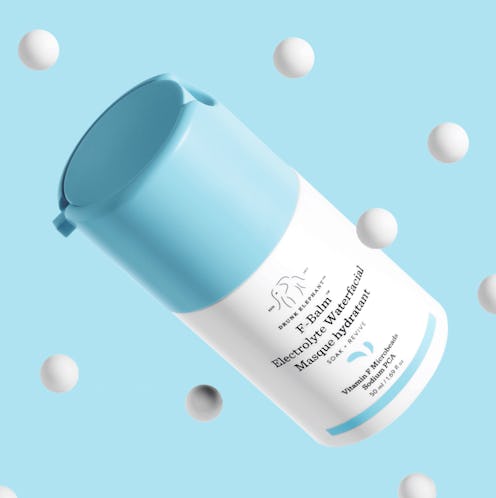(Beauty)
What Is Vitamin F — & Why Is It In Your Skincare?

Vitamin F is not a real vitamin. It’s not even one single nutrient. I would say it’s almost like a vitamin complex, similar to vitamin B — what with all its B3s and B5s and B12s — but that’s not quite right, either. So what is vitamin F, and why is it in your skincare? So glad you asked.
Read more: Multivitamins Vs. Individual Vitamins — Which Are Better For You?
“‘Vitamin F,’ in short, stands for fat,” Dr. Mamina Turegano, M.D., F.A.A.D., a dermatologist who works with direct-to-consumer dermatology company Apostrophe, tells The Zoe Report. “In terms of skincare, this name is sometimes used to refer to two essential fatty acids (EFA): linoleic acid (LA), an Omega-6 EFA and alpha-linolenic acid (ALA), an Omega-3 EFA.”
That sentence and its arrangement of abbreviations is admittedly a little confusing, so I’ll try to break it down: Vitamin F is the term used to describe the combination of two different types of essential fatty acids, linoleic acid and alpha-linolenic acid. To make things more confusing, both of those fatty acids go by different names. Linoleic acid is also referred to as an Omega-6 fatty acid, and alpha-linolenic acid is also referred to as an Omega-3 fatty acid.
“LA and ALA are classified as essential fatty acids, which means our body cannot produce these fatty acids on their own,” she says. However, “They are necessary for maintaining regular functions in our body, including brain, heart, hormone, immune, and skin health, amongst others. We [must] obtain our requirements through outside sources.” Yup, you read that correctly: Your body needs LA and ALA (together, vitamin F) to function properly — hence, why they’re called “essential” — but can’t produce them alone. Technically, humans can get all the vitamin F they need through diet, but there is another way: topical vitamin F.
To understand the allure of vitamin F skincare — see: Drunk Elephant’s soon-to-be-launched F-Balm Electrolyte Waterfacial Mask, Perricone MD’s Essential Fx line — it’s important to understand how vitamin F functions within the skin. “LA acts as a building block of ceramides, which are a type of lipid that help make up the skin cell membrane,” Dr. Turegano says. (Ceramides are also a very buzzy skincare ingredient.) “Both LA and ALA affect immune responses and inflammation in our body; and because LA and ALA play a big role in our cell membranes and immune health, they play a big role in our skin.” The role can be summed up in two words: barrier integrity.
“In order to stay hydrated, the skin needs a mechanism to trap water inside the skin layers, preventing it from evaporating from the cells,” Dr. Nava Greenfield, M.D., F.A.A.D., a dermatologist with Schweiger Dermatology Group in New York City, explains in an email to TZR. “Fatty acids are important components of the many skin layers to maintain its barrier function: maintaining water retention, keeping essential nutrients inside, and environmental toxins outside.” In other words, vitamin F helps lock moisture in, keep toxins and bacteria out, heal existing damage, and prevent “dryness, rough texture, increased sensitivity, allergies, inflammation, aging, and skin conditions like rosacea, acne, eczema, and atopic dermatitis.” That is basically every skin condition known to man, so yeah, vitamin F is pretty important.
Both dermatologists agree that ingestible and topical versions of vitamin F will keep skin hydrated, healthy, and glowing. “Shellfish, seaweed oil, flaxseed, olive oil, canola oil, chia seeds, sunflower seeds, walnuts, and leafy vegetables are high in vitamin F,” Dr. Greenfield says. As far as topical sources, look no further than some of your favorite face oils — vitamin F is built right in. Sunflower, safflower, evening primrose, rosehip seed, flax seed, cranberry seed, avocado, olive, and hemp seed oils are all great sources of vitamin F. You can even "DIY" vitamin F skincare by mixing a face oil that’s high in Omega-3 (grape seed oil, poppy seed oil, castor oil) with one that’s high in Omega-6 (pumpkin seed oil, chia seed oil).
Bonus: “They can also help with the strength and shine in hair,” Dr. Turegano. All I have to say is: F, yeah.
Shop Vitamin F Skincare
This article was originally published on